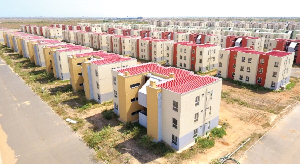Ghana is facing a severe housing crisis, characterized by a significant shortage of affordable housing units.
This crisis has far-reaching implications for the country's economy, population, and overall development.
In this article, we will explore the financial aspects of the housing crisis in Ghana, its causes, effects, and potential solutions.
Causes of the Housing Crisis
1.Rapid Urbanization: Ghana's rapid urbanization has led to an influx of people moving to cities, resulting in a high demand for housing. The population of Accra, for example, has grown from 1.3 million in 2000 to over 4 million in 2020.
2.Limited Supply: The supply of housing units has not kept pace with demand, leading to a significant shortage. According to the Ghana Housing Profile, the country needs over 2 million housing units to meet current demand.
3.High Construction Costs: The cost of building materials and labor has increased, making it difficult for developers to build affordable housing. The cost of cement, for example, has risen by over 50% in the past year.
4.Limited Financing Options: Access to financing for housing development and mortgage financing for homebuyers is limited. Commercial banks in Ghana typically offer short-term loans with high interest rates, making it difficult for developers to secure funding.
Financial Implications
1.Housing Affordability: The high cost of housing has made it difficult for many Ghanaians to afford decent housing. The average price of a two-bedroom house in Accra is over GHS 200,000 (approximately USD 35,000).
2.Rent Burden: Many households spend a significant portion of their income on rent, leaving little for other basic needs. According to the Ghana Living Standards Survey, over 40% of households in Accra spend more than 30% of their income on rent.
3.Economic Growth: The housing crisis hinders economic growth by limiting the availability of housing for workers, thereby affecting productivity and investment. A study by the World Bank found that every 1% increase in housing supply leads to a 0.5% increase in GDP growth.
Potential Solutions
1.Government Intervention: The government can provide incentives for developers to build affordable housing, such as tax breaks or subsidies. The government can also establish a housing fund to provide financing for developers.
2.Public-Private Partnerships: Collaboration between the government and private sector can help finance and develop affordable housing projects. PPPs can bring in expertise, funding, and efficiency to housing development.
3.Mortgage Financing: Increasing access to mortgage financing can help homebuyers purchase homes, reducing the rent burden. The government can establish a mortgage financing scheme or encourage commercial banks to offer long-term mortgage loans.
4. Affordable Housing Programs: Implementing programs like rent-to-own or lease-to-own can help make housing more affordable. The government can also establish a housing voucher program to help low-income households access affordable housing.
Conclusion
The housing crisis in Ghana requires a comprehensive approach that addresses the financial constraints and limitations. By implementing solutions that increase the supply of affordable housing, improve financing options, and reduce costs, Ghana can mitigate the effects of the housing crisis and promote economic growth and development.
By Divine Kabu Akplehey
Divinekabu1@gmail.com
Opinions of Wednesday, 27 November 2024
Columnist: Divine Kabu Akplehey



















